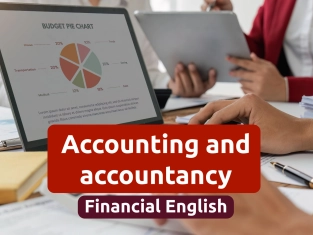by PushtoLearn
Business finance
Table of Contents
Business Finance Exercises and Flashcards
These exercises focus on Business finance
Vocabulary List for Business Finance
1. Set Up (verb)
Definition: To establish or start a business or financial structure.
Example: The entrepreneur set up a new company to sell eco-friendly products.
Explanation: Knowing this term is important for discussing the initiation of business ventures.
2. Capital (noun)
Definition: Money or assets invested in a business to generate income or profits.
Example: The company raised capital through private investors to expand its operations.
Explanation: Capital is a crucial resource for funding business activities and growth.
3. Loan (noun)
Definition: A sum of money borrowed from a lender with an agreement to repay it with interest.
Example: The business took out a loan to purchase new machinery.
Explanation: Loans provide the necessary funds for businesses to finance large expenses.
4. Borrow (verb)
Definition: To receive money or assets temporarily, with the obligation to return them.
Example: The company borrowed funds from the bank to cover startup costs.
Explanation: Understanding this term is essential for discussing how businesses acquire external financing.
5. Interest (noun)
Definition: The cost of borrowing money, usually a percentage of the loan amount.
Example: The bank charged a 5% interest rate on the loan.
Explanation: Interest rates significantly impact the cost of financing and business decisions.
6. Shares (noun)
Definition: Units of ownership in a company, often traded on stock exchanges.
Example: She purchased shares in a tech company to diversify her investment portfolio.
Explanation: Shares represent ownership and provide a way to raise funds for businesses.
7. Shareholder (noun)
Definition: An individual or entity that owns shares in a company.
Example: Shareholders are entitled to vote on major company decisions.
Explanation: Shareholders play a key role in corporate governance and profitability.
8. Own (verb)
Definition: To possess or have legal ownership of a business or asset.
Example: The family owns a chain of restaurants across the city.
Explanation: Understanding ownership is fundamental to discussing business structures.
9. Lend (verb)
Definition: To give money or assets to someone with the expectation of repayment.
Example: The bank agreed to lend the company $50,000 for expansion.
Explanation: Lending is a cornerstone of financing and banking practices.
10. Bonds (noun)
Definition: Debt securities issued by companies or governments to raise funds, with a promise to repay with interest.
Example: The corporation issued bonds to finance its new infrastructure projects.
Explanation: Bonds are an essential financial tool for raising capital without giving up equity.
11. Owe (verb)
Definition: To be obligated to pay or return something, typically money.
Example: The company owes $10,000 to its suppliers.
Explanation: Understanding what a business owes is key to managing liabilities.
12. Liability (noun)
Definition: Obligations or debts a business is responsible for.
Example: The company’s liabilities include loans and unpaid invoices.
Explanation: Liabilities are a critical part of financial management and balance sheets.
13. Debt (noun)
Definition: Money that is borrowed and must be repaid.
Example: The startup accumulated significant debt to finance its initial operations.
Explanation: Managing debt is vital for maintaining financial stability.
14. Credit (noun)
Definition: The ability to borrow money or access goods and services with a promise of repayment.
Example: The business received credit from suppliers to manage cash flow.
Explanation: Credit is an essential tool for business operations and growth.
15. Funds (noun)
Definition: Money available for a specific purpose.
Example: The company allocated funds to develop a new product line.
Explanation: Effective management of funds ensures smooth business operations.
16. Revenue (noun)
Definition: The total income generated from business activities.
Example: The company reported a 20% increase in revenue this quarter.
Explanation: Revenue is a key indicator of business performance and profitability.
17. Net Income (noun)
Definition: The profit remaining after all expenses, taxes, and costs are deducted from revenue.
Example: The company’s net income improved due to cost-cutting measures.
Explanation: Net income reflects the actual profitability of a business.
18. Earnings (noun)
Definition: The profits generated by a business during a specific period.
Example: The quarterly earnings exceeded market expectations.
Explanation: Earnings are a measure of a company’s financial success.
19. Dividend (noun)
Definition: A portion of a company’s earnings distributed to shareholders.
Example: The company declared a $2 dividend per share.
Explanation: Dividends reward shareholders and indicate financial health.
20. Retain (verb)
Definition: To keep or hold back profits for reinvestment rather than distributing them.
Example: The company decided to retain earnings to fund new projects.
Explanation: Retaining profits allows businesses to grow and invest in their future.
21. Financial Statement (noun)
Definition: A document that provides an overview of a company’s financial performance and position.
Example: The financial statement included the balance sheet and profit and loss account.
Explanation: Financial statements are essential tools for analyzing business performance.
22. Profit and Loss Account (noun)
Definition: A report summarizing a business’s income, expenses, and profits over a period.
Example: The profit and loss account showed a net profit for the fiscal year.
Explanation: This account is crucial for understanding the financial results of a business.
23. Assets (noun)
Definition: Resources owned by a business that have value, such as cash, inventory, or property.
Example: The company’s assets include its office building and machinery.
Explanation: Assets represent the resources that drive business operations.
24. Balance Sheet (noun)
Definition: A financial statement showing a company’s assets, liabilities, and equity at a specific time.
Example: The balance sheet revealed the company’s strong financial position.
Explanation: The balance sheet is a fundamental tool for evaluating a business’s financial health.

Wordlist for Business finance, Professional English in Use
|
Word |
Definition |
Example |
|
set up |
to establish or create a business, organization, or system |
Anyone who wants to set up a business can present their idea on the website |
|
capital |
the financial resources, such as money, equipment, or property, that are used to start, operate, or expand a business |
Capital is the money from shareholders and lenders invested in assets in order to produce profits |
|
loan |
an amount of money borrowed from a lender, typically with interest, and expected to be repaid by the borrower over time |
Borrowers can take out a loan for $84,000 |
|
borrow |
to obtain money, goods, or services from someone else with the understanding that it will be returned or repaid |
Can I borrow your car today? |
|
interest |
the amount charged by a lender for borrowing money, usually calculated as a percentage of the loan amount |
Before you take out a bank loan, you need to know how your interest rate is calculated and understand how to calculate it yourself |
|
shares |
units of ownership in a company that represent a portion of its capital, also known as stocks or equity |
He bought shares in a company |
|
shareholder |
a person or entity that owns shares or stocks in a company, entitling them to a share of its profits and assets |
A shareholder is an owner of shares |
|
own |
to have legal or rightful possession or control of something, such as property or assets |
He is very rich because he owns a lot of property |
|
lend |
to give money or assets to someone else with the expectation of being repaid, typically with interest |
Can you lend me $30 until tomorrow? |
|
bonds |
debt securities issued by a company or government, typically used to raise capital, with fixed interest payments and a maturity date |
I invested some money in savings bonds |
|
owe |
to be obligated or indebted to someone else for a specific amount of money or goods |
How much money did he owe when he finished university? |
|
liability |
a legal or financial obligation or responsibility, such as a debt or potential loss, that a company or individual is liable for |
Liability is a duty or obligation for which you're a legally responsible |
|
debt |
an amount of money owed by one person or entity to another, typically with an agreement for repayment |
Did the government debt rise? |
|
credit |
the ability to borrow money or obtain goods or services before payment, based on trust and the expectation of repayment |
Most new cars are bought on credit |
|
funds |
money or financial resources that are available for use or investment |
I made the decision to treat our funds as if it were my personal bank account |
|
revenue |
the total income earned by a company or organization from its business operations, typically from sales of goods or services |
A lot of the hotel revenue comes from food and drink but the rooms are the most profitable |
|
net income |
the remaining profit after all expenses, taxes, and deductions have been subtracted from the total revenue, also known as profit after tax |
Honeywell net income surges to $947 million |
|
earnings |
the amount of money that a company or individual has earned from business operations, employment, or investments |
Average earnings for skilled workers are rising |
|
dividend |
a portion of a company's profits distributed to its shareholders as a payment, typically in the form of cash or additional shares |
A portion of a company's earnings which is paid to the shareholders is dividend |
|
retain |
to keep or hold onto something, such as profits or assets, without distributing or selling them |
And what can be done for the United Nations to retain its verification and inspection expertise? |
|
financial statement |
a formal report that provides information about the financial performance and position of a company |
Businesses report information in the form of financial statements issued on a periodic basis |
|
profit and loss account |
a financial statement that shows a company's revenues, costs, and expenses during a specific period of time, resulting in the calculation of net profit or loss |
Ahold's profit and loss account did not show all its losses |
|
assets |
resources owned by a company or individual, such as cash, investments, property, or equipment, that have economic value and can be used to generate future benefits |
Assets can include cash, stock, inventories, property rights, and goodwill |
|
balance sheet |
a financial statement that provides a snapshot of a company's assets, liabilities, and shareholders' equity at a specific point in time |
Buildings and machinery are assets that should be listed on the balance sheet |
FAQ
What is the difference between revenue and net income?
Revenue is the total income from sales, while net income is the profit left after all expenses and taxes are deducted.
Why are financial statements important?
They provide a comprehensive overview of a business's financial health, helping stakeholders make informed decisions.
How do liabilities differ from assets?
Assets are resources a business owns that have value, while liabilities are debts or obligations the business owes.
What is the purpose of retained earnings?
Retained earnings are profits kept by the business to fund future growth or cover unexpected expenses.
How are bonds different from shares?
Bonds are debt instruments where the issuer promises to repay with interest, while shares represent ownership in a company.

